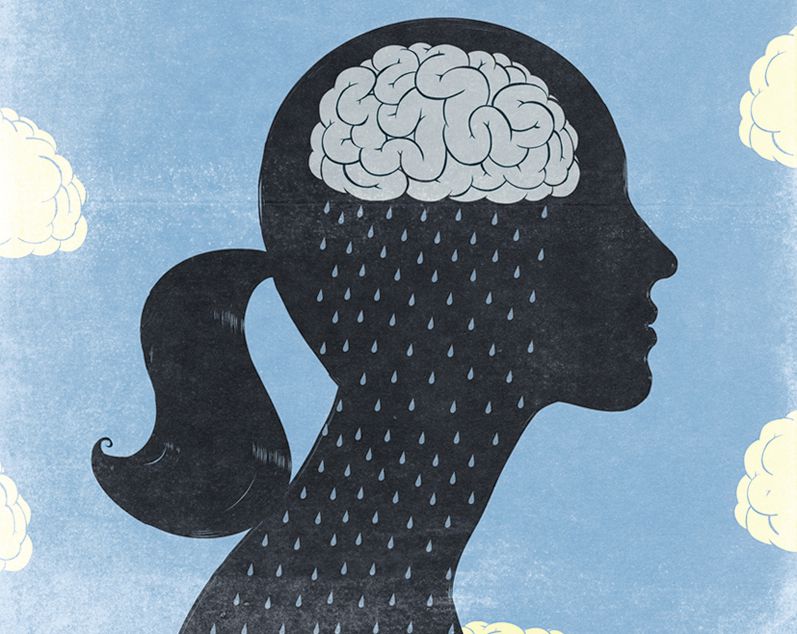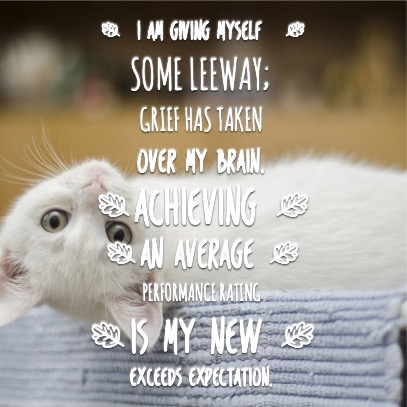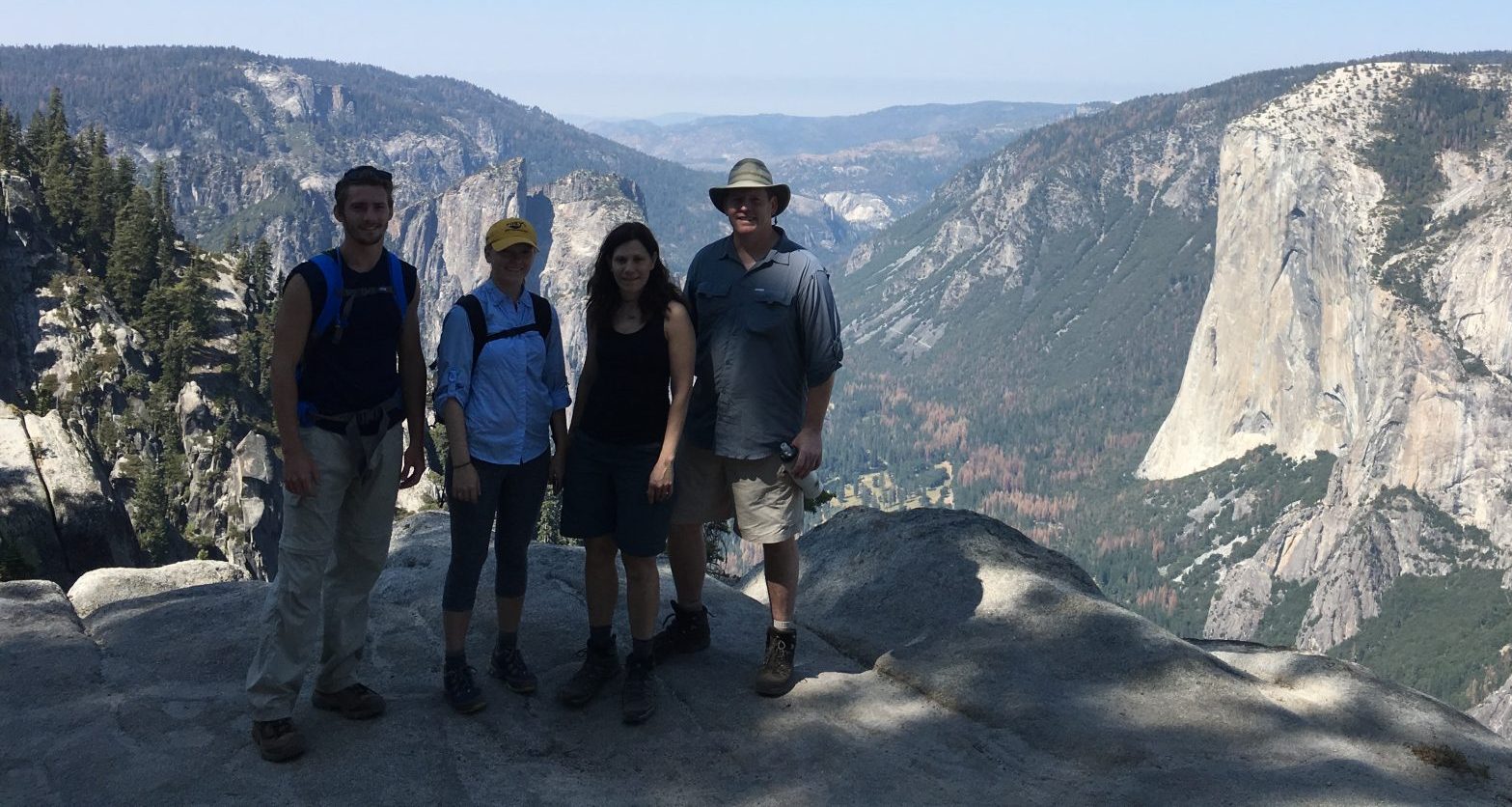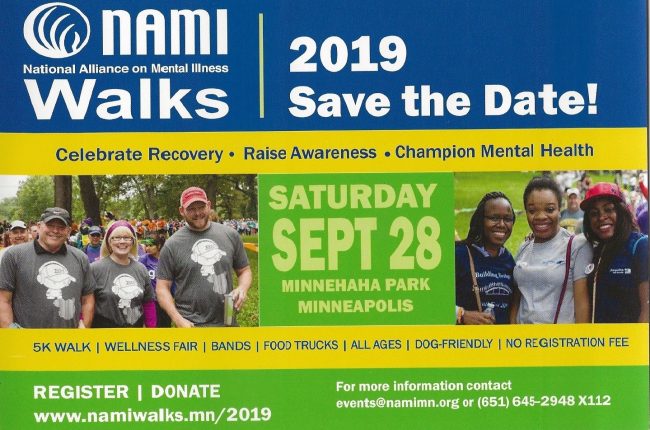search results for
grief brain
Illustration by Shout
Those who have not lost a child told me work is a good distraction. Those who have lost a child told me the same.
There are many famous lines from the Nora Ephron directed and co-written 1993 romantic comedy, Sleepless in Seattle, starring Tom Hanks and Meg Ryan. The film contains parallel stories of two people looking for love. Sam is widowed and is seeking a love that is magical, like the one he had with his wife. Annie is looking for a love that is equivalent to Gary Grant, and Debra Kerr’s Hollywood portrayed love story, depicted in An Affair to Remember.
“Work, work will see you through this.”
The quote I recall did not make the list of those I found on the internet. It is from a scene after the death of Sam’s wife, where Sam’s boss tells him to take some time off from work, for a mental break, and take his son fishing. Sam replies by regurgitating the plethora of unsolicited advice he has received, quoting one, “Work, work will see you through this.” It is the quote I remember now because it is relevant to me. Sam and his young son have to figure out how to live with their grief and the hole in their lives. Work as a tool is the advice he receives from well-intended supporters.
I went back to work after 6 months, from my son’s death, first part-time, and then gradually full-time. At least that was the plan. Part-time quickly led to overtime due to the work demands of my job.
I am not the person I was before, everything seems so much harder, including work.
This job seems so much harder than it did before. It is hard to concentrate. The 10 hour day bombardment of emails, instant messages, and working on the weekend is way beyond tolerable. The before me would be fine with the workload, taking it on, and leading through it. But I am different. Even though this work has meaning, it really is not worth the sleepless nights thinking about how to get the job done, and the risks I need to circumvent. I lay awake at 3:00 am replaying the conversations I had during the day, the actions I ran out of time to complete, pictures in my head of presentation material I need to create, and discussions with leaders I need to undertake.
"How are you?" Is that really a question or an opening statement?
Each meeting someone starts the conversation with the ubiquitous question, “How are you? How was your weekend?” On a recent Friday, after a long week, I replied, “I will never answer anything but fine to this question. I do not think people are prepared to receive a truthful response.
The person I was having this conversation agreed with my statement and then opened up sharing, “I am recovering from a terrible cold, and I was up in the middle of the night with my baby.” I was polite. I did not share, “I am beyond terrible. I am living with an incurable broken heart caused by grief, decreased mental and emotional strength, and a soul that is forever changed. “
I avoid work dinners and small talk. I join meetings last, so I do not have to listen to co-workers describe forgettable events and minor struggles like they are materially significant.
Between meetings, I open up email’s to respond. If the answer is not quick, and I have to think through it, my mind quickly moves on to another topic. My eyes move from the keyboard to computer screens, but not registering anything worthwhile. In the evening after the bombardment of the day is over, I weed my way through my desktop full of open emails, unread messages, and open files. Work days move into work evenings so I can have silence to concentrate.

The Grieving Brain
My mind operates differently than before. I miss appointments. I put them in my calendar and set reminders on my phone to alert me, and I still miss them or show up a day early. I quickly forget passwords, or where I wrote them down, and where I put things. I miss my exit, having to double back. I once accidentally gave the little dog the bigger dog’s medicine and thank goodness I came to my senses in time to dig it out of her throat.
I have a short attention span, memory loss, and anger easy. My grief also impacts me physically. I feel tired and weak and have little desire to exercise or eat healthy food. There is a trauma aspect for going back to work, as it brings back all of those memories of my life before he died and the immense anguish and guilt that comes with it.
There is medical research that proves the grieving brain has more activity than a healthy mind, linking to mood changes and the performance of organs.
“[W]hen brain imaging studies are done on people who are grieving, increased activity is seen along a broad network of neurons. These link areas associated not only with mood but also with memory, perception, conceptualization, and even the regulation of the heart, the digestive system, and other organs.” Crook, Thomas, Ph.D. (2011), Prevention Magazine

I am giving myself leeway. Achieving an average performance rating is my new "exceeds exception."
I don’t know if I want my same thinking capacity back, because it puts me back to where I was before my son died; working. I want a simpler life, where I am not bombarded with endless questions and decisions to make.
A friend and suicide loss survivor said she operates at 50% of her before thinking capacity. She prefers repetitive work, where extensive thinking is not a requirement. My symptoms and feelings are similar to those of other loss survivors.
For now, I am on the road of inertia because doing something else takes the energy I do not have. My therapist urges me to envision doing something else with my life, as I do deserve to be happy. Start by taking little steps to gain the strength to make the change.
Crook, Thomas. “This Is How Your Brain Reacts To Losing A Loved One.” Prevention, Prevention, 13 Dec. 2018, <www.prevention.com/health/memory/a20441690/how-your-brain-reacts-to-grief/>, viewed 16 Feb. 2019.
It will be the second year of the holidays after the loss of my son. In place of coping, we are going to celebrate by focusing on the traditions that bring him with us while creating new ones to make it easier.
After passing the first angel anniversary of my son, my sister commented that his father, sister, and I survived the first year of significant milestones. There was a silent imply that things should get better as the worst of the grief process is over. The holidays are approaching again. It will be the second year without my son, and it is not any easier. The longing, loneliness, and sadness are greater than year one. Everything I have read and felt thus far in year two is much worse than year one.
Of course the first year I was in shock; my brain was consumed with grief. Outwardly I appeared to be functioning, but that was a coverup. Inwardly, I was going through the motions of living, but not really living. Assisted sleep was my refuge. I lived in a daze of “firsts without my son.” I was consumed with understanding why he chose to leave us. I plead with him, or whomever who has control, “Enough already, you can come back now. I am sorry for everything.”
The second year of our lives is harder than the first after the loss of my son.
During the second year, I realize he is never coming back, and this is how life is going to be: without him. Life is gone in an instant, and death is final. There are no second chances. Our intimate family of four is now three. He was the funny one, adventurous, and got us out of our shells and routines. After his death, our lives have stopped, but everyone else’s has moved on. The extended family has happy life events to celebrate, and they have moved on to taking care of their lives’ primary commitments as expected. My son’s friends are more scarce, moving on with their lives too, getting married, having families, starting careers, and seeking adventures. Friends feeling uncomfortable with our sadness are more distant, communicating less frequently. Others who can relate have become closer.
Meanwhile, I have read that the second year is the most difficult for mourners. The shock has worn off, and the pain of grief is on full throttle. It does not get easier until year five, while year three, the fog lifts, and you begin to figure out how to live by bringing your loved one forward with you as you live out your new life (Touched by Suicide, Myers & Fine, 2006).
Sticking with some past holiday traditions and adopting new ones.
We have made it through half of the milestones in year two: my son’s second birthday in heaven, summer vacation without him, the NAMI (National Alliance on Mental Illness) fundraising walk in his honor. The second half contains the holidays. Year one holidays were miserable, and our goal was to get through them.
Therefore, this year I am not going to avoid them, but we are going to do things differently. I will keep the traditions important to my daughter and do those rituals that incorporate my son. We are also starting new traditions where we can celebrate and be happy. My daughter is my first priority, and what makes her happy comes first. Thankfully she articulates her opinions, stands up for what is essential for her, and shares in the planning.
Have a plan, but be willing to improvise.
My plans for this year may evolve, and I will be willing to throw away the ideas if they do not work at the moment. I will decorate the house to help my daughter feel the spirit of the season. I will continue cooking and baking the food my children connect with the season.
Traditions We Will Keep to Remind Us of My Son
Keeping with tradition, we will do the things my son loved:
- Sledding on Hill Top as this is what he and his friends would do in high school and even as adults after a large amount of snowfall.
- Watching the MN Vikings football game. My son could engage with anyone if they knew a little about football. He was always current with what was going on in the league.
- Play ping-pong. My son was really good at the game, having learned in college. His dad was the champion until the year my son came home from college on break. There is a video of him in college, playing with a friend volleying the ball back and forth while both are sitting in chairs and eating.
- Playing darts and cards as this is what Midwesterners do.
- Attend Disney’s latest cinematic movie release. My son loves Disney movies. He created a music playlist of his favorite Disney songs that we listen to on road trips. His friends shared multiple videos of him singing “Let it Go,” from Frozen. I think that is his favorite Disney song. He is also a fan of Marvel and the Star Wars Trilogy, which are both Disney productions. When he would come to the house, discussing these movies was an everyday conversation.
Adding New Traditions to Reduce the Longing
We will incorporate past traditions with new traditions of travel, something all four of love to do and prioritize time with those who bring us comfort and joy.
Mourners can find an influx of articles on grief and the holidays; do what is right for you.
There are published particle guides on how to survive the holidays after the loss of a loved one. You can find stories of what others do, mostly after the loss of a parent or grandparent, some about a spouse. You can find lists and tips on how to remember your loved one and cope. I found one that had 64 tips. Ugh, reading through them, I feel like it is a chore. Very few addresses the loss of a child.
I am going to do what is right for my family and me, and not force it. I will let it evolve as our grief evolves.
References
Myers, Michael F., and Carla Fine. Touched by Suicide: Hope and Healing after Loss. New York: Gotham, 2006. Print.
Related Blog Posts
Family Traditional Holiday Recipes
Consoling Partners
A friend sent me a text message, “Is group tonight? I am having a tough day. It is the eleventh month anniversary of her death.” I read her message after yoga class and called her back on the way home. We try to be each other’s consoling partners. Both our adult children recently died from mental illness.
The usual grief support group meeting I attend, and she occasionally attends, is taking a break, and we were exploring other alternatives. We decided for that night, we would be each other’s support group and continued our conversation.
I am sure our conversation started something like, “Bad day?” “Me too? Have you tried yoga to relieve the stress in your muscles? How about a massage?”
My body hurts every day. The first year after his death, the pain resided in the pit of my stomach like I swallowed a watermelon, and a twenty-pound weight was compressing my heart and lungs. My legs felt heavy as I would walk up the stairs each night to go through the ritual of lying in bed, awake for hours until I eventually gave in to taking a prescribed sleep aid.
Nowadays, the pain has moved out of my chest and to my shoulders, neck, and arms. My friend relays she scheduled a massage. We are supposed to be gentle to ourselves, so I give her encouragement for thinking of herself. I sign up for a foam rolling class.
Everything is Horrible and Wonderful
We move on to another subject. I share I am reading the memoir Everything Is Horrible and Wonderful. I explained the premise of the book, a sibling writing about her life and the death of her only sibling from addiction.
These days I read memoirs on grief and loss because I am looking for perspectives from people like me, experiencing a traumatic loss that changes any semblance of the life you had and vision for the future. I consider them as supplemental reading to my support group.
After sharing the synopsis of the book, I said, “I have not gotten to the wonderful part yet,” and we both broke out cynically laughing because life is no longer wonderful. Initially, I meant that part of the book, but then I realized I was talking about myself. I am very much living in the horrible period of life. My life is in two pieces. There is the before my son died, and then after.
In retrospect, I think the author meant wonderful is her brother, the memories with him, and the impact he had on her and the greater society, as he was a famous comedic writer and actor. For me, it is our family when the four of us were together, my son, daughter, and their father. I contemplate, is wonderful gone forever?
Life is not wonderful anymore; it is different.
Wonderful for me, is our family when the four of us were together, my son, daughter, and their father. I contemplate, is wonderful gone forever?
It seemed like yesterday when he was here, yet an eternity. It has been nineteen months since his death. He was a part of my life for nearly twenty-four years. It is too early to say what life will be like for the three of us other than I wake up thinking about him as the first thing of my day. At night the routine of watching the Late Show with Steven Colbert helps my brain settle until the sleep aid kicks in. Most hours, in-between, are irrelevant.
The three of us have done some things to move life forward. My daughter is continuing her academic education; it has not been easy considering the circumstances. We bought a piece of property along Lake Superior as a sanctuary. We are enjoying the property as we prepare to build a home. We even camp, which I said I would never do again. We raise money for grassroots programs supporting mental illness. I also returned to running because a one-size increase in pants was enough.

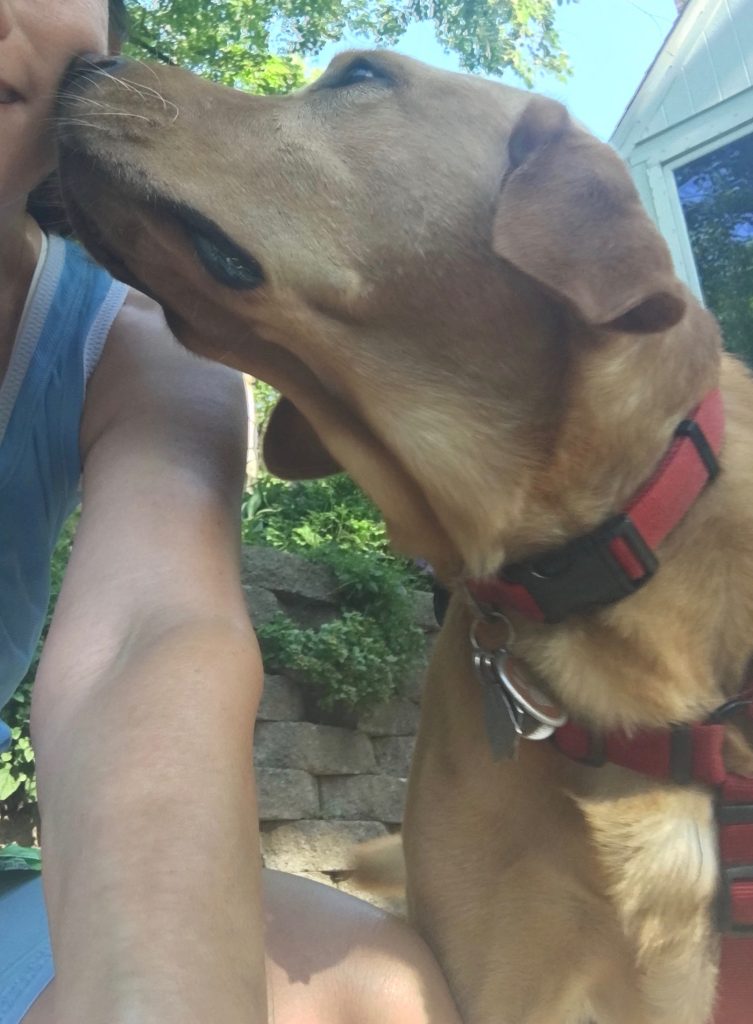
I pay someone to clean my house once a month, something I previously refused to consider. My husband hires the lawn mowing out. I work from home and rarely wear makeup anymore. What we do for dinner is dependent on whether going out requires wearing makeup, so more take-out. I walk our ninety-pound yellow Labrador in the middle of the workday because I cannot sit still through a typical workday.
A friend and parent who I met at Suicide Survivors, a support group, shared, “Life definitely will never be the same as before.” She is correct. Life is not wonderful; it is different.
You are here. It was not your choice, but you are in the ripple. It was not theirs either: your loved one, friend, co-worker, neighbor, class-mate died from a mental illness.
Their minds took over their brain, turned on them, entered a tunnel they could not get out of, and all they wanted to do was end the mental pain. It did not matter how much we loved them, the bright future they had, the goals they set for themselves, the plans they were making. Faith and hope would not prevail.
- A suicide occurs every 11.1 minutes in the United States (suicidology.org)
- One in five Americans lives with a mental illness (NAMI.org)
The death of someone who dies by suicide not only impacts the immediate family or their closest inner circle, it also affects their community. They leave the community to deal with gut-wrenching emotions, questions, and brutal devastation. There is no healing from this complicated loss, but rather over time, survivors learn to cope with the loss. There is an empty hole that resides in the soul of everyone impacted.
So you are here,
- You lost someone close to suicide;
- You are supporting someone who lost someone to suicide;
- Your extended family, community, workplace, school is affected.
For each death by suicide, 147 people are personally affected. This is 6.9 million people annually. Forty to fifty percent of the population has been exposed to suicide in their lifetime (suicidology.org).
For every death by suicide, at a minimum, six people are devastated (suicide loss survivors). One out 62 Americans in 2017 is a loss survivor (suicidology.org).
These numbers are personal to me because I am a loss survivor. I lost the perfect person, my son, in 2018.
The Ripple Effect
This impact of suicide is called the ripple effect, and there is a high probability you are in that ripple.
There is a high probability you or someone you know is experiencing a mental health condition.
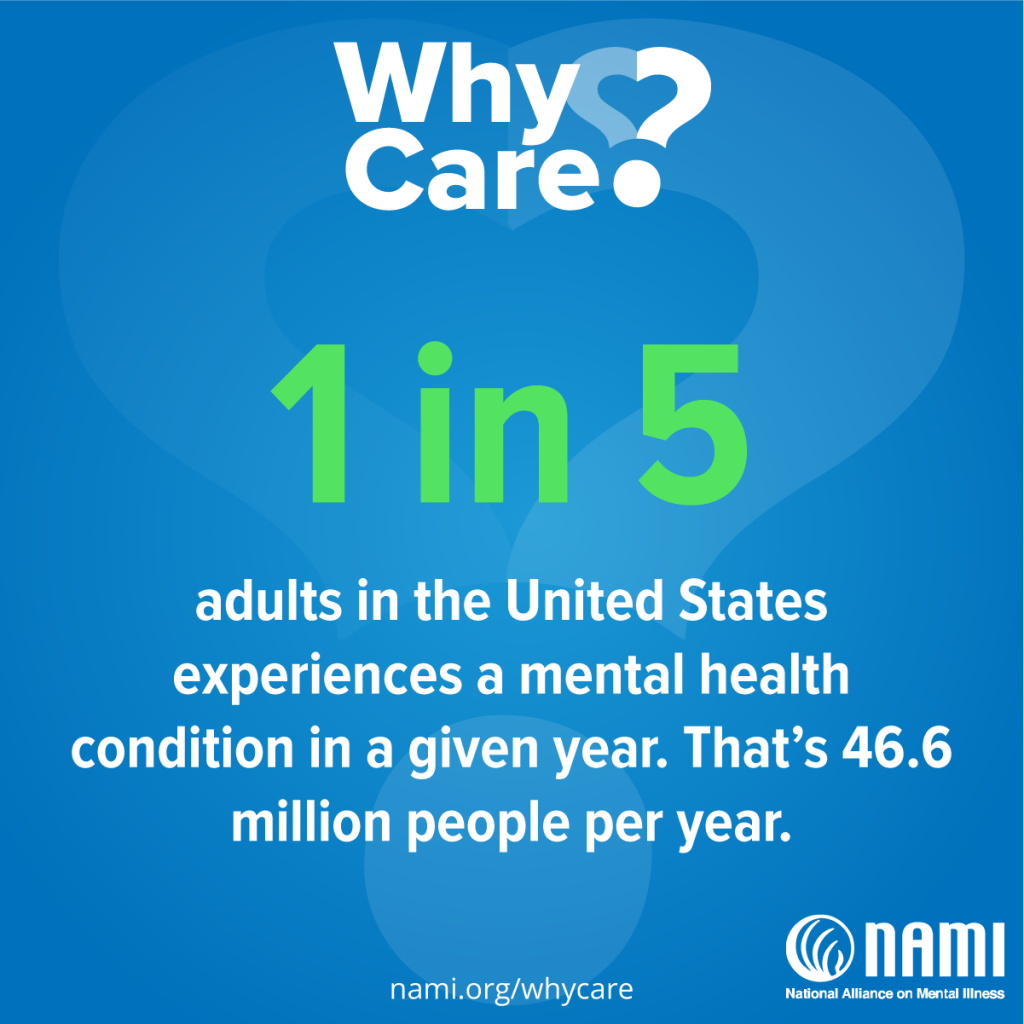
One in five Americans lives with a mental illness
There is no healing from suicide loss. I have seen from others further along in their grief, years past the death of their loved one, that they go on living, but now is the time for the community, friends, and extended family to be an active support system.
- Acknowledge loss survivors will never be the same, nor want to, but do want to be happy again and live life taking their loved one along with them.
- Acknowledge that no person’s social or economic status or family upbringing precludes them from mental illness;
- Many sufferers do not share their mental pain outwardly, and those close to the suffering may not have any idea they are contemplating suicide, including mental health professionals;
- You can help the loss survivors by being there for them and not waiting to be asked or told what they need;
- Advocate reducing discrimination of those with a mental illness;
- Openly talk about mental health to reduce the negative stigma;
- Raise funds to provide community education and resources for those fighting for new legislation on mental health initiatives.
You can support your own family, mine, and others by walking to raise funds for grassroots programs and research to prevent suicide and help those with a mental illness.
There are many national and community-based non-profits. I have chosen the NAMI, National Alliance on Mental Illness, who works with communities and legislators, advocating for those with mental illness to remove barriers and end the negative stigma. You can find a local walk on their website, or you can walk with us and donate to team Willpower here. We accept donations even if you do not walk and you do not need to give to walk.
I had this great person, and I failed to protect him. I failed to help him feel good about himself, to help him be successful at whatever he wanted to do; to feel supported. I failed to provide a safe place for him to share his suffering. I failed to see the signs.
I have been attending a suicide survivor support group for nearly four months. During the sessions, I connect with fellow survivors who are living through the grief after a loved one took their own life.
In a recent session, families were asked to share their loved one’s interactions with the behavioral health care system.
We learned that all of our loved ones had some degree of treatment or interaction with the system, including inpatient care. You know their ending; the treatment was unsuccessful.
Their experiences varied, but we were able to draw some conclusions:
- There aren’t enough behavioral health resources.
- Our loved ones were not appropriately diagnosed.
- When loved ones did seek care, providers were unable to emotionally make a connection with them to take treatment seriously.
- Our adult loved ones did not take action to seek or continue treatment on their own accord, after in-patient care. There was no provider follow-up to continue engagement.
- Providers were unable to find the right medication and dosage before time ran out.
- Therapists, psychiatrists, and facility doctors did not provide coordinated care.
- Our loved ones were not taught how to seek treatment during a crisis.
- They were not taught that it is normal and healthy to seek treatment.
- For those over 18, patient privacy laws hinder the family’s ability to interact with their loved one’s health care providers (while still maintaining some privacy).
- None of our loved ones voluntarily dialed 911, called a suicide hotline, or called their therapist.
- And of course, navigating the healthcare system is just foreign and cumbersome for young adults.
I had this great person, and I failed to protect him. I failed to help him feel good about himself, to help him be successful at whatever he wanted to do; to feel supported. I failed to provide a safe place for him to share his suffering. I failed to see the signs. Of the signs I did see, I failed to understand the seriousness of what they meant.
I have written about his before, but it weighs on me every second of every day.
There is a strong link between depressive disorders and suicide.
There was a mental health professional on the radio today who was bringing awareness to suicide prevention. He said there is a strong link between depressive disorders and suicide. He said that depression can come from a chemical imbalance between serotonin [ser’ a toe’ nin] and norepinephrine [nor-eh’-pin-ef’-rin]. That did not mean much to me, so I did some research. My master’s degree should be good for something; having taught me how to research and to write (though professionals may find the latter debatable). I am not a medical professional, so you may want to do your own research, but this what I found:
“Serotonin [ser’ a toe’ nin] is widely known for playing a major part in regulating moods. It has been called the body’s natural “feel-good” chemical because it’s involved in your sense of well-being. However, that’s only true when your serotonin level is within the normal range.” (Salters-Pedneault, Kristalyn P, 2018).
“Norepinephrine [nor-eh’-pin-ef’-rin] is a stress hormone. It’s mainly stored in the neurons (nerve cells) of the sympathetic nervous system with small amounts also stored in the adrenal tissue, which lay on top of your kidneys. As a hormone, norepinephrine is released into the bloodstream by the adrenal glands and works alongside adrenaline (also known as epinephrine) to give the body sudden energy in times of stress, known as the “fight or flight” response. As a neurotransmitter, norepinephrine passes nerve impulses from one neuron to the next.” (Purse, Marica, 2018).
“An imbalance of these two chemicals can lead to the person not understanding the options available to help them relieve their suffering. Many people who suffer from depression report feeling as though they’ve lost the ability to imagine a happy future, or remember a happy past. Often they don’t realize they’re suffering from a treatable illness, and seeking help may not even enter their mind. Emotions and even physical pain can become unbearable. They don’t want to die, but it’s the only way they feel their pain will end. It is a truly irrational choice. Suffering from depression is involuntary, just like cancer or diabetes, but it is a treatable illness that can be managed.” (Suicide Awareness Voices of Education, SAVE.org 2018).
There needs to be more research on mental illness and prevention needs to start in the pediatrician's office. There needs to be more education for parents and teachers.
There needs to be more research…on how to detect this chemical imbalance in the primary care doctor’s office. When you go in for your annual physical, medical providers should be able to detect this imbalance through a simple blood draw.
It should start when our children are in the pediatrician’s office. Parents and educators who interact with diagnosed children should take seriously all mental health diagnosis.
Parents and educators should be required to know the signs of suicidal ideation. Schools should be staffed with mental health advocates.
My son was smoking and ingesting street marijuana. We know he ingested the “day of.” I have asked my psychiatrist to help me understand what impact marijuana has on the body. My psychiatrist, along with every therapist I have talked to, said it is a drug, and it alters the brain. Street marijuana typically contains synthetics which adds an additional variable.
My question is; does marijuana also contribute to the imbalance in the brain?
My question is; does marijuana also contribute to the imbalance in the brain?
My son was a scholar and sought out information. I came across material on marijuana that was in the viewing history of his computer. These videos were neutral towards marijuana, but for obvious reasons, I grasped onto specific findings. I have summarized what I think is relevant to my son’s situation.
“Ingesting marijuana binds to receptors in your brain, making them continually fire and causes your imagination, thoughts, and perceptions to magnify, making every thought and feeling, feel like a significant one. Smoking marijuana has effects within minutes and lasts for two to three hours. Heating up marijuana in oil and digesting it delays the effect as it first needs to metastasize through the liver. It can last four to eight hours and adds an additional compound not found in smoking that increases its potency and lasts longer. It takes one to two hours to feel the effects and it is harder to control the intensity of the high, ending up higher than you intended to.” (AsapSCIENCE, 2017).
I read the comments posted on this video, which included people discussing their own experiences. Some users said, “When they ingested marijuana, they experienced hallucinations.” I think the experience can vary by the person based on their brain composition, how much they ingest, and other compounds found in the drug.
A second video my son watched said this about marijuana and mental health:
“There is moderate evidence, for people with mental health issues, it worsens symptoms, cognitive performance, and suicidal ideation and attempts.” (Healthcare Triage, 2017).
Some say marijuana is just for social gatherings or “fun”. It may have started that way for my son, but according to the medical community, if you have a mental illness (e.g. depression, anxiety, ADD/ADHD) it hasnegative consequences.
At my request, the National Alliance on Mental Illness (NAMI) gave me resources on marijuana and suicide. One of the medical journals reported on a study which found that “early and frequent use of cannabis is associated with the major depressive disorder (MDD) as well as suicidal thoughts and behaviors, a large twin study suggests.” (Yasgur Swift Batya, 2017).
- Marijuana worsens the ability to conduct executive functioning (to organize cognitive processes like planning ahead, prioritizing, stopping and starting activities, shifting from one activity to another and monitoring one’s own behavior).
- It also hampers the working memory (the ability to store and manage information for a short period of time).
- Frequent use of marijuana can also lead to not caring about things that are important, such as school or work. Kids and young adults using marijuana are less likely to keep up with their medication.
- Marijuana for some can increase anxiety, including paranoia. Street marijuana is usually stronger than medical marijuana as it may contain other chemicals.
- People with attention deficit disorder or attention deficit hyperactivity disorder (ADD/ADHD) are 2.5 times more likely to develop a substance abuse problem. (understood.org 2018)
Some say marijuana is just for social gatherings or “fun”. It may have started that way for my son, but according to the medical community, if you have a mental illness (e.g. depression, anxiety, ADD/ADHD) it has negative consequences.
I found these statistics on SAVE.org 2018 about suicide:
- Suicide is the 10th leading cause of death in the US for all ages. (CDC)
- Every day, approximately 105 Americans die by suicide. (CDC)
- There is one death by suicide in the US every 12 minutes. (CDC)
- Depression affects 20-25% of Americans ages 18+ in a given year. (CDC)
- Suicide takes the lives of over 38,000 Americans every year. (CDC)
- Only half of all Americans experiencing an episode of major depression receive treatment. (NAMI)
- 80% – 90% of people that seek treatment for depression are treated successfully using therapy and/or medication. (TAPS study)
- There is one suicide for every estimated 25 suicide attempts. (CDC)
- These statistics have led the medical community to call the cause of death by suicide a “crisis.” I never thought it (suicide in my family) would happen to us. Don’t be afraid to talk. Be there for someone else. Learn the signs. Help remove the stigma.
Share what you think. What has been your experience? Leave a comment at the end of this post.
To honor my son, his sister, father, and I will be walking to raise money for NAMI, Team Willpower! We would be honored if you joined us in whatever way you feel comfortable.
REFERENCES
AsapSCIENCE (2017, March 23). Our Brain on Edible Marijuana, video recording, YouTube, viewed 20 August 2018, <https://www.youtube.com/watch?v=pUhJnKKQDTE>.
Healthcare Triage, What We Know About Pot in 2017 (2017, February 13), video recording, YouTube, viewed 21 August,2018, <https://www.youtube.com/watch?v=yewlM8CtbQU&t=345s>.
Purse, Marica (updated 2018, May 03). What is Norepinephrine’s Role in Treating Mood Problems?. verywellmind.com 2018, viewed 21 August 2018, Retrieved from <https://www.verywellmind.com/norepinephrine-380039>.
Salters-Pedneault, Kristalyn P, (updated 2018, July 9). How Serotonin Regulates Different Body Functions, verywellmind.com 2018, Retrieved from <https://www.verywellmind.com/what-is-serotonin-425327>.
Suicide Awareness Voices of Education (SAVE.org) 2018, Depression, viewed 21 August,2018, Retrieved from <https://save.org/about-suicide/mental-illness-and-suicide/depression/>.
Suicide Awareness Voices of Education (SAVE.org) 2018, Suicide Statistics and Facts, viewed 21 August 2018. Retrieved from <https://save.org/about-suicide/suicide-facts/>.
The Understood Team, understood.org 2018, Experts Weigh In: Marijuana and ADHD, viewed 21 August 2018. Retrieved from <https://www.understood.org/en/learning-attention-issues/child-learning-disabilities/add-adhd/marijuana-and-adhd>.
Yasgur Swift Batya, MA, LSW, (July 31, 2017). Heavy Cannabis Use Associated With Depression, Suicidality. Medscape 2017, viewed 21 August 2018. Retrieved from < https://www.medscape.com/viewarticle/883614?src=soc_fb_share>.
